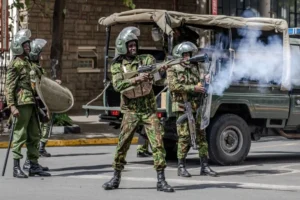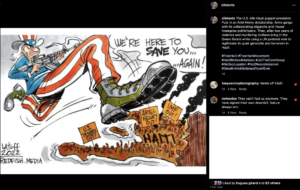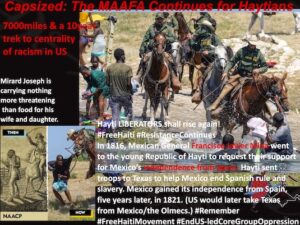Recommended links for HLLN’s Campaign Two: Equal Treatment for Haitian refugees, stop deportations, justice for the ill treated Haitian asylum seekers (Previous page);
See also, Preserve Haiti remittances ;
There are 55,000 reasons to be fair to Haitians”¦ (editorials);
Dec. 9, 2010 – HLLN’s Haiti Message to the US Embassy in Haiti: The Will of The People; and,
HLLN Letter to U.S. Immigration and Customs Enforcement (ICE) proposed Policy for Resumed Removals to Haiti (ICE)
***********************
IMMIGRATION: US double standards toward Immigrants
| HLLN post on this page on United States inequitable and double standard towards Haitian immigrants, 2011:
Halt Haitian deportation, April 20, 2011 There are 55,000 reasons to be fair to Haitians, Jan. 6, 2011 Silence on Haiti, Jan. 9, 2011 US deports first Haitians since earthquake, Jan. 20, 2011 U.S. resumes deportations to quake-ravaged Haiti, Jan. 20, 2011 Florida: Repatriations to Haiti Resume, January 20, 2011 Deportees from U.S. face bleak prospects in Haiti, April 24, 2011 “The U.S. deportation policy applies to noncitizens who receive sentences of a year or more in jail. An estimated 700 Haitians are slated for deportation this year, said Barbara Gonzalez of U.S. Immigration and Customs Enforcement. (Deported Haitians illegally detained in Haiti.) Haitian quake refugees worry as U.S. visas expire, May 12, 2011 Visas for Haitian Earthquake Evacuees Extended In shift, US grants ‘temporary protected status’ to Haitian quake victims, May 17, 2011 Visas for Haitian Earthquake Evacuees Extended, May 17, 2011
(See also: Ezili Dantò on the election of Michel Martelly ; Beating back the elite’s rabid rage; Seismic shifts and Avatar Haiti) |
(Editorials from: Los Angeles Times, Miami Herald, Washington Post)
**************************
Halt Haitian deportations
The following editorial appeared in the Los Angeles Times on Monday, April 18:
The resumption of deportations to Haiti revives a senseless and inhumane policy by the Department of Homeland Security. The last time this occurred, in late January, at least one of the deportees died within days, prompting a nearly three-month hiatus in deportations that has now been lifted for no good reason.
Conditions in Haiti remain appalling as the nation struggles to overcome a severe humanitarian crisis. An estimated 680,000 people are still stuck in camps for the displaced 15 months after the powerful earthquake that destroyed much of Port-au-Prince in January of 2010. A cholera epidemic has affected 234,000 people and caused a reported 4,500 deaths. A recent article in the British medical journal The Lancet estimated that, “absent new interventions,” the epidemic could sicken some 800,000 people and kill 11,000.
The Obama administration is extending financial and material aid to Haiti, along with governments from around the world and numerous aid agencies. Aid workers are racing against the clock in a heroic effort to save and protect lives as another hurricane season approaches. Yet Obama’s own government is working at cross-purposes with them – and with itself – by casting more Haitians back into this scenario of misery.
Officials from Immigration and Customs Enforcement (ICE) say the deportations were resumed because of a rigid timeline: Courts have ruled that those with a final order of removal must be released if they are not removed – that is, deported – within 180 days of detention. They say all 19 deported last week were convicted of at least one serious felony in the United States and that the list includes “those whose serious criminal histories mean they would pose a significant threat to local communities if released.”
Haitian advocates challenge that assessment as “inaccurate and misleading.” In a letter written to President Obama last month, they said: “Far from being limited to ‘violent felons,’ the people slated for deportation include people with only nonviolent misdemeanor records and nonviolent drug offenses. Many have family members, including young children, who are United States citizens and who rely on them for support.”
Moreover, they note, Haitians are discriminated against by a double standard that does not allow them to benefit from the flexibility shown to other nationals. The deportations can be stopped while still keeping the public safe, they insist. “ICE has robust supervision and electronic monitoring programs that it routinely uses to monitor noncitizens with criminal backgrounds who cannot be deported – including people from Cuba and other countries to which deportation is not possible and people who are stateless.”
The larger issue involves human rights violations. Earlier this year, the Inter-American Commission on Human Rights took note of the deplorable, inhumane conditions in Haitian jails, particularly the complete lack of medical attention, and said the deportations should be halted, at least until the Haitian government can guarantee improvement. As it stands, the Haitian government can’t guarantee anything of the sort. It can’t even guarantee acceptable living conditions for hundreds of thousands of displaced earthquake victims, much less jail inmates.
DHS Secretary Janet Napolitano should order a halt to deportations until conditions in Haiti improve. She should also consider granting deferred action and stays of removal for Haitians based on the humanitarian crisis in that country. It’s the right thing to do.
**************************************
OUR OPINION: There are 55,000 reasons to be fair to Haitians
As the first painful anniversary of Haiti’s earthquake approaches, recovery efforts are mired in a dysfunctional government, a cholera outbreak not of that nation’s making and a flawed election that has left Haitians understandably angry and frustrated.
The international community — from the United Nations to the Organization of American States, and, of course, the United States — is attempting to resolve the political impasse in the recent elections.
Health officials from around the world are helping Haitians fight the cholera killer likely brought from abroad.
But only the Obama administration can help Haitians help themselves by allowing the 55,000 Haitians who have approved U.S. visas from before the quake to join their families here.
Incredibly, the Department of Homeland Security hasn’t bothered to do right by those 55,000 Haitians.
Instead, Homeland Security is poised to send back undocumented Haitians to a country that’s stressed beyond most people’s imaginations and seems to be shutting the door on 55,000 legal — we repeat legal — immigrants whose families have promised to support them until they can find work.
Meantime, U.S. officials are opening another door to the Cuban spouses and minor children of legal Cuban immigrants here after a months-long delay that had put in jeopardy U.S. assistance to 3,200 Cuban migrants.
Why the double standard?
The 55,000 Haitians could work here legally and help their families or friends in Haiti, which would only improve the dismal life of those loved ones they left behind. In fact, without remittances, Haiti would be in much worse shape. In 2009, Haitians in the United States sent more than $1.5 billion to relatives there.
This delay is unnecessary and destructive. The 55,000 have been vetted by U.S. immigration officials. They are approved to go, but it could take four to 11 years to get them here because of a U.S. backlog of approved visa-holders.
Clearly, Haitians should be at the front of that line.
Their country has crumbled, and with the help of family in America they can become productive here while helping Haiti’s economy through remittances, which would aid Haitians start businesses there once the rebuilding is at full steam.
There are thousands more Haitians waiting for visa approvals whose cases merit expedited approval, too.
Lifting the quota system for Haitians because of extraordinary circumstances would be the humanitarian thing to do, requiring no special act of Congress because the 55,000 already have approved visas.
For months, immigration activists have been talking with White House officials to nudge Homeland Security Secretary Janet Napolitano to sign off on expediting those 55,000 approved visas. Still, nothing.
The United States has a long history of helping refugees facing chaos in their homelands. Haitians surely qualify. To condemn legal immigrants to more time in tent cities, with the potential of a cholera epidemic and more political unrest, is shameful.
America cannot take care of every person in the world facing catastrophe, but in this case there is no other moral option. They’re legal — let them in.
******************************
Silence on Haiti
January 9, 2011, Washington Post Editorial
A YEAR AFTER it was leveled by an earthquake, Haiti remains, in many ways, a feeble ward of the international community. Rubble from the quake clogs much of the capital of Port-au-Prince; 1 million people are still living in tents; and Haiti’s economy, fragile to begin with, is mostly supine. In the past few months, things have been made even worse by bitterly disputed and inconclusive national elections and by a cholera epidemic that has sickened tens of thousands and killed around 3,500 since October. Despite the success of the massive international relief effort in saving lives and meeting basic humanitarian needs just after the temblor, reconstruction remains a pipe dream for most Haitians.
Given Haiti’s deep-seated problems, it was always optimistic to imagine the country would be whole again in 12 months, or “rebuilt better,” as the sunny post-quake slogan had it. Given the international community’s own checkered experience with long-term rebuilding projects, it was equally optimistic to suppose that the billions of dollars promised to heal Haiti would flow smoothly and quickly and be spent efficiently. .
What is genuinely disappointing, though, is that the Obama administration appears to have given no serious consideration to one major initiative that would make an immediate and positive difference in the lives of tens of thousands of Haitians. Namely, it could grant entry to 55,000 Haitian visa candidates with relatives already in the United States.
This hardly radical proposal has been embraced by the U.S. Conference of Mayors, which represents the very cities that would assume the costs of an influx of immigrants. Moreover, the would-be immigrants’ petitions to enter the United States and rejoin their families have already been approved by the Department of Homeland Security. Once the visa backlog – a function of quotas set by Congress – is cleared, the Haitians are likely to settle in this country anyway.
Given the acute needs and deep suffering, it makes moral and economic sense to move them to the front of the line. If Congress will not adjust its visa quotas, then the administration could, on its own, accelerate the entry of applicants who otherwise face waits of four to 11 years, grant them “temporary protective status” on arrival and allow them to work. The remittances they would send home could support thousands of Haitians now struggling to survive.
To date, the administration has turned a deaf ear, barely acknowledging such appeals. . That undercuts the president’s pledges that the United States stands ready to do everything possible to help. As the mayors noted last summer, America, the hemisphere’s richest country, retains a moral obligation to help Haiti, the poorest
***************************
US deports first Haitians since earthquake
MIAMI (AP) — Immigration authorities repatriated 26 Haitians previously convicted of crimes on Thursday, plus another man who was acquitted in a 2007 terror plot, the first such deportations since the Obama administration halted them following the devastating 2010 earthquake.
The deportations were immediately criticized by members of the Haitian-American community and immigration advocates who say the Haitians will face dire, inhumane conditions on their return.
“I think it’s outrageous and it’s inhumane and very insensitive,” said Marleine Bastien, executive director of the Haitian Women of Miami. “We are outraged, really outraged.”
An attorney for Lyglenson Lemorin, who was acquitted in 2007 of a plot to destroy the Sears Tower in Chicago, confirmed the 35-year-old man was among those deported.
Officials have said Lemorin remained a national security threat. Five others were convicted in the case.
“Mr. Lemorin’s removal is a high water mark in the injustice inherent in our broken immigration system,” Charles H. Kuck, his attorney, said. “Deporting an innocent man should never be condoned.”
Kuck is appealing the Lemorin’s deportation.
In a statement, Barbara Gonzalez, spokeswoman for U.S. Immigration and Customs Enforcement, said the removals were “consistent with ICE’s priority of removing aliens who pose a threat to public safety.”
Gonzalez added that ICE will continue the deportations on a periodic basis.
Cheryl Little, executive director of the Florida Immigrant Advocacy Center, a nonprofit law firm, said the Haitian deportees were being sent back to a “death trap.”
“Why is it so urgent for the U.S. to deport Haitians when Haiti remains in ruin?” she said.
According to the firm, deportees sent to Haiti who have a criminal history are routinely held in inhumane jail conditions, not fed or provided medical care.
“Whether or not they have served a criminal sentence, no Haitian should be sent to a cholera-infested jail where they risk death,” the organization said in a statement.
Haiti is still recovering from the magnitude 7.0 earthquake that killed an estimated 316,000 people and a subsequent cholera epidemic that has killed thousands and complicated recovery efforts. The tiny Caribbean nation is also facing political instability following the disputed Nov. 28 first-round presidential election.
On Sunday, former Haitian dictator Jean-Claude Duvalier unexpectedly returned after being forced into exile following a mass uprising nearly 25 years ago, sending shock waves through the country.
Duvalier took over the presidency after his father, Francois “Papa Doc” Duvalier, died and ruled from 1971-1986 and has been accused of widespread human rights abuses.
Bastien said her organization found out about the deportations after being contacted by relatives of the repatriated Haitians. She said the families are “devastated.”
“There’s a high chance that they will be detained in Haiti, and we are really concerned about their safety,” she said.
Florida State Rep. Daphne Campbell, whose district includes Miami’s Little Haiti, said she didn’t wish to comment on the deportation of those convicted of crimes, but that she did reach out to Vice President Joe Biden and President Barack Obama in hopes of discussing immigration policy toward Haitians.
***************************
U.S. resumes deportations to quake-ravaged Haiti
Jan 20, 2011, Source: Reuters
MIAMI |
MIAMI (Reuters) – The United States resumed the deportation of Haitians on Thursday for the first time since the devastating earthquake that struck the poor Caribbean nation last year.
Barbara Gonzalez, a spokeswoman for Immigration and Customs Enforcement, said 27 Haitian nationals with criminal records in the United States had been returned to their homeland.
They were the first of about 700 Haitians classified as “criminal aliens” who have been targeted for removal to the Western Hemisphere’s poorest country this year, Gonzalez said in an email response to Reuters.
“These are the first removals since they were suspended last year,” Gonzalez said, confirming the end of a moratorium on such deportations declared immediately after the January 12, 2010 quake.
“All of those removed were men, who had been previously convicted of a crime in the U.S.,” she said.
She announced earlier that the removals were consistent with a policy of removing Haitians in the United States who pose “a threat to public safety.”
Gonzalez said those deported included Lyglenson Lemorin, a 35-year-old legal U.S. resident, who was acquitted of all charges in Miami’s so-called Liberty City Seven terrorism-conspiracy case in December 2007.
The Obama administration has been quietly moving since late last year to resume deportations of Haitians.
The renewal comes as Haiti is still recovering from the crippling earthquake and grappling with a dispute over presidential election results from November, as well as a cholera epidemic that has killed nearly 4,000 people.
Immigration officials have said previously that they will only deport Haitians who have been convicted of crimes and finished serving their sentences, as part of this year’s resumption of forced removals from the United States.
Other Haitians, including non-criminals and those granted a special immigration classification known as Temporary Protected Status, are unlikely to face removal anytime soon, according to one law enforcement source familiar with immigration policy.
(Reporting by Tom Brown; Editing by Chris Wilson)
*****************************
Florida: Repatriations to Haiti Resume
By THE ASSOCIATED PRESS | January 20, 2011 | Source: New York Times
Immigration authorities have repatriated 26 Haitians convicted of crimes and one man acquitted of a plot to destroy the Sears Tower in Chicago, the first deportations since the Obama administration halted them after the 2010 earthquake in Haiti. Immigrant advocates say political unrest and cholera in Haiti make it inhumane to deport people there. But the United States announced last month that it would resume deporting those convicted of violent crimes who had served their time. Marleine Bastien, executive director of Haitian Women of Miami, called the deportations “inhumane and very insensitive.” The man acquitted in the Sears Tower case, Lyglenson Lemorin, was among a group sent back to Haiti on Thursday, his lawyer said. Officials say he remained a security threat.
***************************
HLLN Letter to U.S. Immigration and Customs Enforcement (ICE) proposed Policy for Resumed Removals to Haiti (ICE), 2011
HLLN Archives on Campaign Two: Equal Treatment for Haitian refugees, stop deportations, grant TPS, justice for the ill treated Haitian asylum seekers, 2004 to 2010
Deportees from U.S. face bleak prospects in Haiti
After the catastrophic 2010 earthquake in Haiti, the U.S. suspended deportations. The practice resumed three months ago, to the outcry of human rights activists and Haitian government protests.

A deportee arrives in Port-au-Prince from the U.S. Deportees are detained upon arrival in Haiti and released once their families are identified. (Rachele Magloire, For The Times/October 18, 2004)
By Allyn Gaestel, Los Angeles Times, April 24, 2011
Reporting from Port-au-Prince, Haiti”
Dumped in a squalid holding cell and then shunned by a society he doesn’t know, Patrick Escarment struggles to learn Creole and build a life in earthquake-devastated Haiti.
His arrival here this year was not voluntary. Escarment was in the first group of Haitians with criminal records to be deported from the United States to Haiti after a one-year moratorium.
After the Jan. 12, 2010, earthquake that destroyed most of this capital and killed more than 300,000 people, the Obama administration suspended deportations. The practice resumed three months ago, to the outcry of human rights activists and the protest of the Haitian government.
Escarment was born in the Bahamas to a Haitian woman trying to move to the United States. When he was 4, they moved to Florida, where he had lived ever since. He said he got involved in small-time drug-dealing during “real tough times” after his mother’s death and spent 18 months on probation on a cocaine-sales conviction.
Because his only paperwork was Haitian, Escarment was placed on an overnight flight from Louisiana and taken to Haiti for the first time in his 21 years. He and 26 traveling companions were immediately carted off to a police station and placed in a holding cell in conditions he describes as hellish.
“The place was so dirty, mold everywhere,” Escarment said. “They don’t give you tissue to use the bathroom, the toilet is all clogged…. They don’t give you covers to sleep on, nothing, we had to sleep on concrete.”
In a petition filed with the Inter-American Commission on Human Rights, the Center for Constitutional Rights and other groups likened the deportations to a “death sentence,” citing the unsanitary conditions in the holding cells and the cholera epidemic in the country.
One of the men who arrived with Escarment died, apparently of cholera, shortly after being released from the holding cell.
“The United States cannot deport anyone if there would be a violation of their right to life, or their right to family life, especially if they have children, and their right to fair trial and due process,” Sunita Patel, an attorney with the Center for Constitutional Rights, said in an interview.
The U.S. deportation policy applies to noncitizens who receive sentences of a year or more in jail. An estimated 700 Haitians are slated for deportation this year, said Barbara Gonzalez of U.S. Immigration and Customs Enforcement.
This month, Washington deported a second group of 19 Haitians convicted of crimes.
Deportees are systematically detained upon arrival in Haiti; because they are rarely wanted on charges here, the government releases them once their families are identified.
Haiti’s chief prosecutor, Harycidas Auguste, acknowledged that detaining deportees is against Haitian law, which requires speedy processing of suspects and bans the jailing of Haitians who completed sentences in other countries. The detentions, he said, are “completely illegal and arbitrary.”
But the secretary of state for public safety, Amarick Louis, defended the policy: “We can’t consider these people to be saints; we have to consider them as they are…. We have to control them on some level.”
A few high-profile crimes by deportees appear to have sullied the reputation of the entire population. Most, however, try to find jobs teaching English or using skills they picked up in the U.S., said a government official who handles the issue.
When Escarment and his companions finally left the holding cell, they found themselves in an unfamiliar country, adrift in a sea of homelessness and unemployment, judged harshly by society as they try to rebuild their lives.
“Some people have the assumption that deportees are coming back to do mishaps, to steal and destroy and rob people,” said Moise William, a 38-year-old deportee with three children in the United States.
Serge Dorval, a deportee now living in a tent, likened the situation for the unpopular new arrivals to “putting raw meat in a tank of piranhas and expecting it to still be there tomorrow.”
There are few support services for the deportees. Michelle Karshan runs Alternative Chance, a small organization that has worked with deportees for a decade. “It’s not a popular subject, and after the earthquake even less so,” she said, “because it’s adult criminals from the States, it’s not a poor peasant child.”
Alternative Chance provides a variety of services, including job training and conflict resolution, but Karshan acknowledges that it cannot replace government services.
Still unemployed, Escarment is struggling to find his way in Port-au-Prince, where he lives with an aunt whom he just met. He left a pregnant girlfriend behind in the U.S. and regrets that he won’t be able to raise the child.
He said he has even contemplated suicide. “This deportation,” he said, “has been a downfall for me.”
Gaestel is a special correspondent.
***********************
Haitian quake refugees worry as U.S. visas expire
By Marisol Bello, USA TODAY
May 12, 2011
MIAMI — Time is running out for many Haitians who came to the USA after the 2010 earthquake and now may be sent back to a country in chaos.
President-elect Michel Martell, who will be inaugurated Saturday, has an ambitious agenda to restore his country, but conditions are grim: hundreds of thousands still living in tents, scant public services, a stubborn cholera outbreak.
In the USA, meanwhile, many earthquake survivors are jobless, scrambling for medical care and relying on friends and family for food and shelter.
Visas are expiring, and immigration officials have not acted on most requests for a change in status that would let them stay in the USA and earn a living.
After the earthquake on Jan. 12, 2010, the U.S. government allowed Haitians to be in this country under various conditions:
ӢHumanitarian parole is an emergency status that was granted to 1,400 Haitians, including those who came for medical care. They are allowed to stay and work for up to one year. However, if the parole is not extended, they must go home.
ӢVisitor visas were issued to 1,300 Haitians, including some escorting children or medical evacuees. Visitor or tourist visas are good for up to a year, and extensions may be granted, but the visitor is not allowed to take a job. Since the earthquake, Citizenship and Immigration Services (CIS) has approved 77% of 1,736 requests from Haitians with visitor visas, including some who were here before the earthquake, who want to extend their stay.
ӢDeferred action allows those with visitor visas to upgrade their status to stay longer and work. Since the earthquake, 835 Haitians have requested deferred action. Of those, a third have been approved; the rest are pending.
Such requests are often granted in less than a month, says Cheryl Little of the Florida Immigrant Advocacy Center.
“The fact that the government has not granted deferred actions (to Haitians) is appalling,” she says. “Why would we not grant a small number of Haitians the ability to recover and give them a temporary reprieve?”
Gepsie Metellus, executive director of Sant La Haitian Neighborhood Center, a Miami social service agency, says Haitians who came after the earthquake need to work so they can rebuild their lives and return to Haiti. “The tourist visa enables you to see tourist sites,” Metellus says. “You can go to Disney World, but that’s it.”
The Manigat family wants to go home, but not with Haiti in its current condition. For now, they want to get jobs in Miami.
The Manigats arrived on visitor visas a little more than a month after the earthquake. They had been living on the street in Port-au-Prince with their daughters, then 7 and 2, after their third-floor apartment collapsed. In Miami, they moved in with Fritz Gerald Manigat’s sister. They sleep on the floor.
Last summer, the family’s visas expired, and they filed for deferred action.
Still no decision, Manigat, 39, says in Creole through a translator. “We are not able to work. We are in limbo.”
Crowding in with his sister, her husband and their young son has strained relationships. Manigat returned to Haiti briefly last spring to look for work, but he says things were so bad he couldn’t take his wife and daughters back. He and his wife, Marie France, 35, worry that they will be deported.
Matt Chandler, spokesman for the Department of Homeland Security, which oversees CIS, would not comment on why CIS has granted few deferred actions for Haitian visitors. “We are continuing to review the issue,” he said in an e-mail.
Rep. Frederica Wilson, D-Fla., says the plight of the earthquake survivors has become entangled in the stalled national debate over immigration.
After the earthquake, the Department of Homeland Security created a temporary status to allow Haitians who were here illegally before the disaster to remain and work for up to 18 months. The department has approved 47,000 of 54,000 applications for “temporary protected status.” Wilson wants President Obama to give post-quake refugees the same deal.
Even the few Haitians who have had their status upgraded face challenges.
Sandrise Vital, 30, had a tourist visa when she was flown to South Florida for medical care. A wall fell on her after the earthquake, and doctors had to amputate her left leg. She is paralyzed from the waist down and uses a wheelchair.
She received deferred action and would like to work, but for now, she says, she needs to recuperate. She needs neurological care and rehabilitation therapy she can’t afford. She is not eligible for government medical benefits.
Vital spends her days in the home of her cousin’s ex-wife, a nurse, in West Palm Beach. She speaks English, French and Creole and would like to work as a translator.
“There are more options here,” Vital says. “To stay would be a good thing.”
*************
In shift, US grants ‘temporary protected status’ to Haitian quake victims
Boston.com , May 17, 20111 | http://bo.st/muAnqv
The move extending so-called temporary protected status to the Haitians marks a major shift for federal officials, who had resisted granting it to thousands of Haitians in part to discourage a life-threatening mass migration by sea. The announcement comes days after Haiti inaugurated a new president.
Under their new status, the Haitians who came after the quake will enjoy the protected status until Jan. 22, 2013. The government also gave the 18-month extension to Haitians who came to the US before the quake. It had been set to expire in July.
“Providing a temporary refuge for Haitian nationals who are currently in the United States and whose personal safety would be endangered by returning to Haiti is part of this administration’s continuing efforts to support Haiti’s recovery,” Secretary of Homeland Security Janet Napolitano said in a statement.
The estimated 10,000 people who had fled after the quake on visitor visas, which they overstayed because they had no jobs or homes to return to, ended up crowded into relatives” homes or homeless and living in motels, as the Globe reported in January.
Haitian immigrants and advocates cheered the news with tears and hugs today. Most had spent the past year and four months in limbo, descending into poverty while the reconstruction stalled in their homeland, leaving them nothing to return to.
Nonprofit groups such as Catholic Charities assisted them with English classes and other aid. Yesterday, an official with the charity said the announcement would transform their lives.
“We are all ecstatic,” said Marjean A. Perhot, director of refugee and immigration services of Catholic Charities Archdiocese of Boston. “I ran down the hall I was so excited. We are so thrilled, so thankful. Today has made the lives of thousands of Haitians hundreds of times better.”
In Brockton, where in January the Globe revealed that many Haitian families who fled the quake had ended up homeless and living in motels, Judeline Manigat hailed the news as a lifesaver for her husband, who arrived after the quake. With her husband unable to work, the couple ended up living in the Quality Inn in Brockton.
“Good! That’s good,” Manigat said. “I’m very happy.”
Temporary protected status is a discretionary tool that the Homeland Security agency uses in cases of emergencies to allow people from a nation torn by war or disaster to receive temporary safe haven in the United States until the US government deems that it is safe for them to return.
People must apply and pay fees in exchange for permission to live and work in the United States.
Haiti’s earthquake Jan. 12, 2010, destroyed most government buildings and killed an estimated more than 230,000 people. Hundreds of thousands of people are still homeless and a cholera outbreak has killed more than 4,800 people.
******************
Haitians Who Fled Earthquake Get More Time in U.S.
Tuesday, May 17, 2011
By Marianne McCune
http://bit.ly/kV8oZk
The Department of Homeland Security announced Tuesday that, more than a year after an earthquake devastated the island nation, it will allow Haitians who came to the U.S. in the year following the earthquake to apply for Temporary Protected Status, the same work visa extended to those living here before the disaster.
The U.S. government will also extend the duration of the temporary work visas of Haitians who already qualified. They were set to expire in July this year but, with the extension, they will expire in January, 2013.
When an earthquake shook Haiti so hard that much of its capitol city fell to pieces, the U.S. offered Haitians living in the country illegally a special visa so they could work and send money to their struggling families. But for those Haitians who fled the tragic collapse of Port-au-Prince and traveled to the U.S. with visitor’s visas in hopes they, too, could find a way to support themselves and their families, there was little help.
At the time, the Haitian Baptist Church in Canarsie, Brooklyn, was among many local institutions that did not know how to advise the desperate Haitians looking for a way to make their lives, at least temporarily, in New York.
A woman named Micheline — who was afraid to give her last name — was bouncing from one friend’s house to the next with a wound still open on her leg from when her house had collapsed on top of her. She said her husband had died in the earthquake.
“I have problems,” she said a few months after her arrival, “I have no way to live, to eat, I don’t work. I have problems!” Now, Haitians like Micheline will be able to apply for legal working papers.
An official with the US Coast Guard warned the visa is not available to Haitians who arrived in the U.S. any later than January 2011. The Coast Guard said it has encountered more than 600 Haitians risking their lives to come the U.S. by boat over the last year — 152 during just the month of May. They have been repatriated.
The Department of Homeland Security said it will continue to deport Haitians who are here illegally and have been convicted of crimes, as announced earlier this year. Haitian advocates have been urging the government to stop, calling it inhumane to send them back to Haiti given how little has improved since the earthquake.
Temporary Protected Status visas are only granted to people who have no felony convictions and no more than one misdemeanor.
Details were still to come as to when and how Haitians can apply for Temporary Protected Status or renew the TPS visas they have already received. The Department of Homeland Security said it will release more information soon.
************************
Visas for Haitian Earthquake Evacuees Extended
Temporary protective status for qualified Haitian immigrants extended another 18 months
http://bit.ly/lgTjy7
The government is giving Haitian immigrants who fled their island nation after last year’s devastating earthquake more time to live and work in the U.S. legally while their country rebuilds.
The Department of Homeland Security announced Tuesday it was extending a temporary protective status for qualified Haitian immigrants for another 18 months. It was due to expire in July.
Homeland Security officials said in a statement that Haitian immigrants who have “continuously resided” in the U.S. since Jan. 12, 2011, will also be eligible for the protection. The rule had previously applied only to immigrants who arrived in the immediate aftermath of the devastating earthquake.
So far, at least 48,000 Haitians have been granted protected status.
Councilman Mathieu Eugene of Flatbush, himself a Haitian-born immigrant, and other advocates had lobbied the government to extend the program past the July expiration date.
Eugene told NBC New York last week that the Haitian community in his district has grown significantly since the earthquake, and the lack of infrastructure, resources and medical care in the country make returning an unacceptable option.
He called the renewal of the program “a humanitarian response.”
*********************
White House follows bishops’ recommendation on Haitian immigrants
Source: Catholic News Agency
.- The U.S. Catholic bishops expressed appreciation on May 17 for the Obama administration’s decision to extend the “Temporary Protected Status” of Haitian immigrants, in keeping with the bishops’ own recommendations.
“It is simply the right thing to do,” said Archbishop Jose H. Gomez, the U.S. bishops’ chairman on migration. “This action will permit those who entered the United States in the aftermath of a devastating natural disaster to remain and work to support their families.”
The administration’s decision will extend Temporary Protected Status, or TPS, for another 18 months, beginning on July 23. It will apply to Haitians who entered the U.S. up to one year after the earthquake that struck the island on January 12, 2010.
Tucson, Arizona Bishop Gerald F. Kicanas, chairman of Catholic Relief Services, noted that many of these immigrants were sending money back to a country hit hard by disease and natural disasters.
“The re-designation of TPS to Haiti will preserve the flow of much-needed remittances to that stricken country,” he said. He said these money transfers from friends and relatives were “vital to bolstering the fragile Haitian economy and supporting the national recovery.”
However, both bishops are concerned about deportation of some individuals back to Haiti. The deportations stopped temporarily after one deportee died of cholera in a Haitian jail, but resumed in April 2011.
“We remain troubled by the resumption of deportations to Haiti,” said Bishop Kicanas, noting that the country may be “ill-equipped to handle them” in a manner that would respect prisoners’ human dignity.
More than a million Haitians remain homeless due to last year’s earthquake, and there are fears that the coming rainy season will worsen the ongoing cholera epidemic.
********************
Make a Donation to support Ezili Dantò’s Work
If you appreciated these postings, updates and the writings of Ezili Dantò of
HLLN giving voice to the voiceless in Haiti, please consider making a donation.
Add a comment:
Powered by Facebook Comments









No Pings Yet